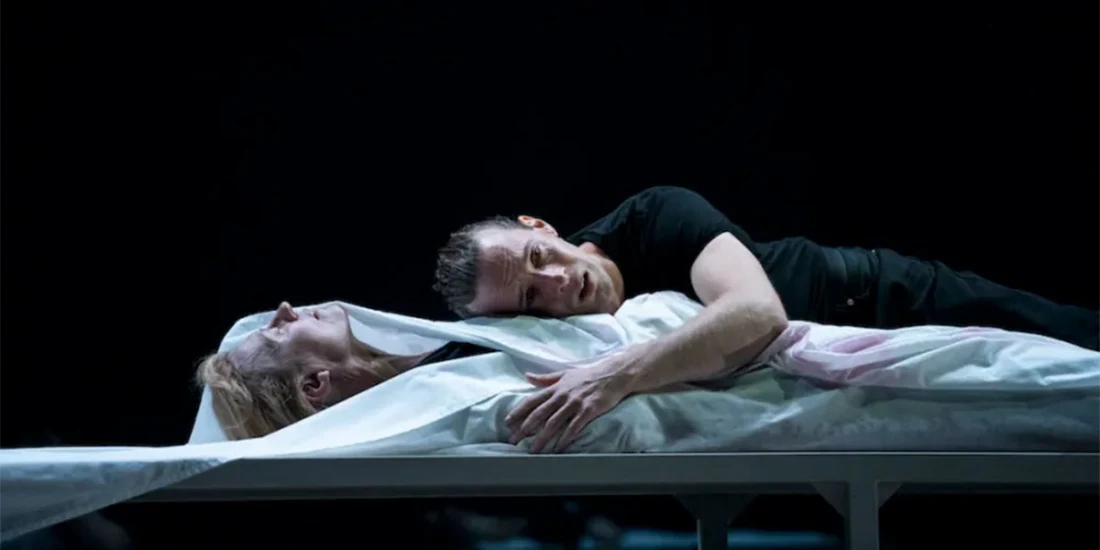‘Oresteia’ at Park Avenue Armory review — a muddled, modernized Greek tragedy
Anastasia Hille is doing the most right now. She stars in the new adaptation of the Greek tragedy Oresteia at Park Avenue Armory as Klytemnestra. In the role, she plays a grieving mother, a wronged wife, a cunning strategist, and a murderer.
She delivers a strong performance, in more ways than one. After she commits murder, she has to physically drag the dead body several feet and down two steps, while the corpse leaves a streak of red blood in its wake. It's a stomach-churning moment, and Hille is impressive in her athleticism. I felt sore just looking at her. It's a pity that the rest of the production doesn't match the raw power of Hille's performance.
British director Robert Icke, whose angsty yet enjoyable Hamlet (also playing at Park Avenue Armory), has adapted the Greek trilogy Oresteia by Aeschylus. Instead of three separate plays, Icke's Oresteia is now a three-and-a-half-hour evening at the Armory. Icke adds more dialogue and more themes to Aeschylus's text, and the play almost buckles under the weight.
Aeschylus's first play in his trilogy, Agamemnon, details the Greek king coming home after winning the Trojan War, and his wife Klytemnestra subsequently murdering him. But Icke begins his Oresteia even earlier. He incorporates parts of Euripedes's Iphigenia in Aulis, where Agamemnon is told by the gods that if he wants to win the Trojan War, he must offer up his daughter Iphigenia as a sacrifice. (Icke's adaptation doesn't mention Troy, only referring to the conflict by the generalized term, "the war," seemingly to give his adaptation a more timeless feel.)
By making Iphegenia's death a large part of the production, Icke smartly emphasizes that her murder is the instigating event that breaks up Agamemnon's family and begins a destructive cycle of revenge and death. Elayna Faith Randolph and Alexis Rae Forlenza share the role of Iphigenia, who is depicted in the show as a child, which makes her death that much more chilling. Randolph, the night I saw the show, twitched her body in a way as she was dying that made me queasy.
But Iphigenia's death also highlights the cracks in the production. There is an explosive scene with Agamemnon and Klytemnestra arguing about sacrificing Iphigenia. There, Hille is at her most powerful. She is tall and formidable against Angus Wright's Agamemnon (Wright is a regal presence, but his take on Agamemnon is so gentle and full of ennui that it makes his abhorrent actions unbelievable).
"This is about us. This is about a person who came from us, who would never have lived if we hadn't loved each other. What you are destroying is us," Hille laments, imbuing Klytemnestra with pathos and intelligence. But it also means that, because of the modern setting and Hille's performance, one can't help but wonder why this Klytemnestra doesn't just take Iphigenia and run away?
That's the rub with putting Greek tragedies into a contemporary setting, as Icke does here. The nondescript set, by Hildegard Bechtler, is spare aside from a long white table and picnic benches. Bechtler also dresses the characters in somber tones, aside from Iphigenia, smartly wearing bright yellow. She's the sun, and when she dies, there's only darkness.
But in this modern setting, located in an unnamed country, the way the characters act makes no sense. In Greek myth, the gods are the instigating factor — they are just as impetuous and flawed as humans, and humanity is powerless under their command. This Oresteia has stripped out most of the references to the gods and their fickle ways. So why does Agamemnon kill his daughter, and why is their son Orestes (Luke Treadaway) compelled to kill his mother in revenge?
Most of the thematic strands that Icke added into this production are so underexplored that they end up muddying the play and undercutting its power and any catharsis. Though what the production lacks in coherence, it does make up for partly in effects — there's a sound cue by Tom Gibbons, played during Klytemnestra's death, that was bone-chilling and made me jump.
The original Oresteia was notable for its faith in the rule of law; its ending gesture favoring mercy instead of retribution was a revolutionary sentiment for the time. At that point, Icke also tries to tack on a theme about the corruption of the court system, and how crimes against women are always minimized. But the attempt at relevance is unsuccessful, because it requires a more unlikeable, and less remorseful, Orestes. Despite him being onstage for a majority of the play's running time, Treadaway does not have much to do as Orestes besides being tortured and confused. It's a one-note approach to a character that needs more complexity to be compelling.
Ultimately, what Icke tries to place on a trilogy of plays written over 1,000 years ago feels like putting on a jacket that's too big. Aeschylus's text doesn't fill those gaps. At the end, Orestes repeatedly asks the audience, and himself, "What do I do?" For me, I was wondering, "What am I supposed to feel?"
Oresteia is at Park Avenue Armory through August 13. Get Oresteia tickets on New York Theatre Guide.
Originally published on
